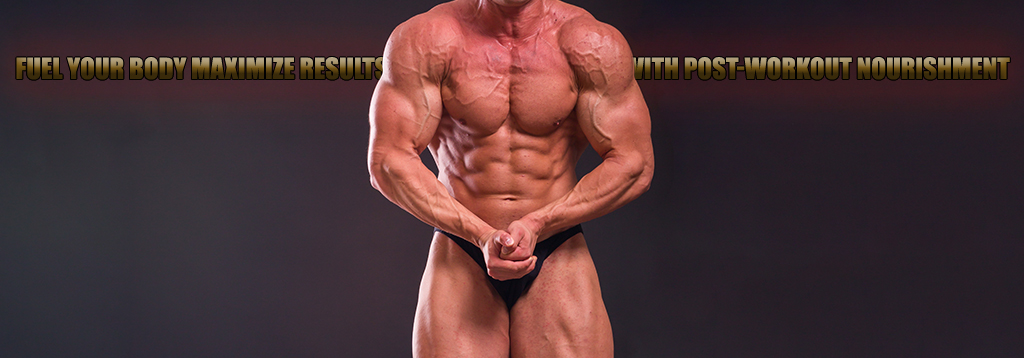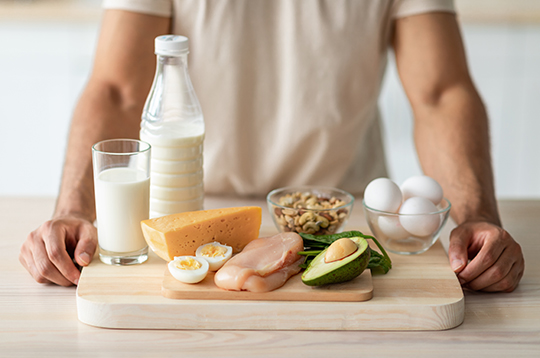
Many people overlook the importance of post-workout nutrition when exercising and building muscle. However, eating the right foods after a workout can significantly affect your overall progress. Post-workout nourishment helps maximize results by replenishing energy stores, supporting muscle recovery, and promoting proper hydration. Knowing which food groups to include in your post-workout meal can make all the difference in maximizing performance and achieving fitness goals.
Post-Workout Nutrition
Post-workout nutrition is an essential part of any fitness regimen. The food and drinks consumed immediately after a workout are just as important as the exercise itself. Eating the right foods can help repair muscle tissue, refuel energy stores, and aid recovery.
One recommendation is that athletes consume a meal or snack within 30 minutes of finishing their workout to maximize their efforts and results. This meal should be composed of high-quality carbohydrates to restore energy levels, lean proteins to help build and repair muscle tissue, plus healthy fats for necessary nutrients. Additionally, it is crucial to stay hydrated both during and after exercising by drinking plenty of water.
By following these guidelines for post-workout nutrition, individuals can ensure they get the most out of their fitness program while avoiding fatigue and injury due to a lack of proper fueling.
Why Is It Important?
Post-workout nutrition is essential to any exercise routine and crucial to achieving fitness goals. Conversely, poor post-workout nutrition can lead to reduced energy, poor muscle recovery, and inadequate nutrient replenishment. Therefore, it is vital to understand why post-workout nutrition matters and how it contributes to optimal health and performance is essential.
After a workout, the body needs protein for muscle repair, carbohydrates for glycogen stores, electrolytes for hydration levels, vitamins and minerals for immunity support, healthy fats for hormone balance, and amino acids to promote muscle growth. Without these essential nutrients after exercise, the body cannot correctly restore itself or achieve desired results from physical activity. Therefore, eating adequate nourishment before and after physical activity is essential.
Benefits of Post-Workout Nutrition

Post-workout nutrition is vital for building muscle and recovering after a workout. Proper post-workout nutrition can help you optimize your gains, reduce soreness, and improve performance. Without good food after a workout, you're missing out on many benefits of exercise.
One of the main benefits of post-workout nutrition is the growth of muscle tissue. When you exercise, your muscles are broken down and need rebuilding to grow bigger and stronger. Eating protein after your workout helps provide the building blocks for this process to occur more quickly. Additionally, consuming carbohydrates following your training will replenish glycogen stores in your body, which can help to increase strength and power output during subsequent workouts.
What to Eat and When?
Knowing the right foods to eat before and after a workout can help ensure you get the maximum benefit from your time in the gym. This article will examine why post-workout nutrition is so important, what foods are best for recovery, and when is the optimal time to eat them.
The most critical aspect of post-workout nutrition is replenishing lost energy stores. During an intense workout, your muscles deplete glycogen stores, leading to fatigue and decreased performance if not adequately replaced soon afterward. Consuming high-quality carbohydrates such as fruits, whole grains, or starches within 30 minutes after a workout helps refuel muscles with vital energy, providing lasting benefits throughout your day.
Hydration & Recovery
Hydration and recovery are essential components of post-workout nutrition that help athletes to optimize their performance. After a hard workout, replenishing fluids, carbohydrates, and electrolytes are vital for your body to recover quickly and efficiently. Hydrating properly after exercise helps to maintain optimal energy levels throughout the day and can also help with muscle repair and tissue growth.
Drinking plenty of water during and after exercise is vital in helping you stay hydrated. Drinking is critical if you're exercising in hot weather or sweating heavily during a session. Sports drinks are another option for replacing lost electrolytes from sweat or vigorous activity. They can also provide an added boost of energy when recovering from strenuous physical activity.
Supplements: Pros & Cons
Post-workout nutrition is an integral part of any fitness routine. The right food choices can help with muscle recovery and promote overall health. But what about supplements? Are they necessary to fuel your body after a workout?
When it comes to an understanding the pros and cons of taking supplements, there is no one-size-fits-all answer. While supplements may be beneficial for some individuals, they are not essential for everyone who exercises regularly. Conversely, certain supplements can accelerate muscle recovery from intense workouts or offer helpful nutrients that would otherwise be hard to find in everyday foods. However, some people experience adverse reactions when taking supplements, like upset stomachs, headaches, or dizziness. In addition, high doses can potentially have long-term effects on your health, like liver damage or kidney stones, if consumed over time.
Whole Food Vs. Nutritional Supplementation
Regarding post-workout nutrition, there is much debate over whether whole food or nutritional supplementation is best. Whole foods contain vitamins and minerals essential for our bodies to recover and repair after strenuous exercise. Foods such as fruits, vegetables, nuts, and whole grains contain these nutrients. On the other hand, nutritional supplements offer an easy way to get the necessary amounts of vitamins and minerals without having to eat a large amount of food. They provide convenience and portability when on the go but lack the same benefits as eating real food.
The post-workout window is a critical period for refueling our bodies with essential nutrients like protein, carbohydrates, and fat to help repair damaged muscles from exercise. Studies have shown that both whole food and supplement sources are equally effective in optimizing recovery post-exercise.
Benefits of Liquid Meals for post-workout
One of the most significant benefits of liquid meals for post-workout nutrition is that they're fast and easy to make or purchase. You can quickly whip up delicious smoothies with fruits and vegetables or buy pre-made shakes with all the necessary vitamins and minerals. Liquid meals also digest faster than solid food, meaning your muscles get the essential nutrients they need right away to repair any damage caused by exercise. Liquid meals benefit post-workout nutrition because your body needs to recover quickly. If you were to eat a solid meal after a workout, it could take hours for your muscles to absorb the nutrients and begin repairing themselves. A liquid meal, however, will be digested quickly so your body can get to work repairing itself.
Conclusion: Unlocking Performance
Post-workout nutrition is an essential factor to consider when striving for peak performance. Eating after exercise helps replenish energy stores and provide your body with the nutrients it needs to repair and rebuild muscles, improve recovery time, and reduce fatigue. Therefore, proper post-workout nutrition should be vital in unlocking optimal performance.
To maximize the benefits of a workout regimen, athletes must pay close attention to their diet. While carbohydrates are essential for providing energy during exercise sessions, protein is also crucial for helping build muscle mass and strength. A combination of both can help improve overall performance by allowing you to push harder and longer than before. Additionally, fluids such as water or sports drinks can help replace lost electrolytes while exercising. To achieve maximum results from any training session, you should take all these steps into account.





